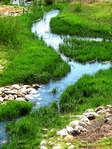Asian Environments: Governing Nature, Negotiating Knowledge, Constructing Subjectivities
Workshop
30.11.2012 – 02.12.2012
Location: Rachel Carson Center for Environment and Society (RCC), Munich, Germany
Conveners: Ursula Münster (LMU Munich / RCC), Shiho Satsuka (University of Toronto / RCC), and Gunnel Cederlöf (Uppsala University)
Call for Papers - Invitation only (pdf, 299 KB)
Program - English (pdf, 171 KB)
Conference report (pdf, 406 KB)
Reflecting on the dynamic changes in environmental governance in Asia and its importance in the global context, the Rachel Carson Center for Environment and Society will host a two-day interdisciplinary workshop. The workshop aims to address in a comparative fashion how people in Asia have experienced changing forms of environmental governance in various places and at different historical periods. It will inquire into how they have negotiated and articulated modes of environmental knowledge and how their struggle and engagement with changing forms of nature management and competing knowledge systems have informed the construction of their subjectivities.
The workshop will bring together researchers from different disciplines and diverse sub-regional expertise and foster an engaging discussion and exchange of ideas. Through interdisciplinary dialogue, it aims to address both the commonality and diversity of historical trajectories that inform current environmental issues in Asia. The discussions will situate the Asian experiences and histories in a global context and explore how changing global power relations influence environmental governance in the region and, in turn, the global implications of the study of Asia.
Guiding themes for discussion:
- Formation of governance structures for managing human-nature relations in specific locations and at national and transnational levels.
- Expected and unforeseen transformations of landscapes and livelihood due to governmental and transnational policies—industrial and agrarian in relation to environmental.
- Subject formation both as a consequence of and in opposition to transformations in nature and the deterioration of particular landscapes.
- The expression, assertion, and utilization of different, sometimes competing forms of knowledge about human-nature relations.
- The challenge of reconceptualizing human-nature relations in the present while acknowledging the past.
Submitted papers (Password protected; for participants only)
Anna Lora-Wainwright (pdf, 167 KB)
Arupjyoti Saikia (pdf, 685 KB)
Bao Maohong (pdf, 87 KB)
Bridget Love (pdf, 168 KB)
Celia Lowe et al (pdf, 100 KB)
Elena Kim (pdf, 171 KB)
Gunnel Cederlöf (pdf, 448 KB)
Gunnel Cederlöf (short version; pdf, 230 KB)
Iftekhar Iqbal (pdf, 59 KB)
John Knight (pdf, 166 KB)
Kuntala Lahiri-Dutt (pdf, 101 KB)
Ling Zhang (pdf, 154 KB)
Ralph Litzinger (pdf, 166 KB)
Sanjukta Das Gupta (pdf, 202 KB)
Shiho Satsuka (pdf, 154 KB)
Ursula Münster (pdf, 105 KB)
Vipul Singh (pdf, 445 KB)


